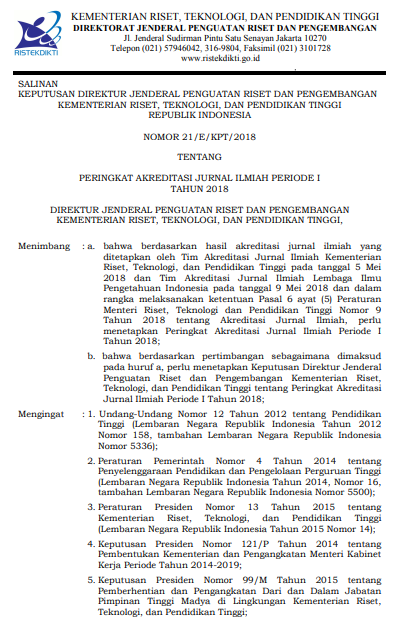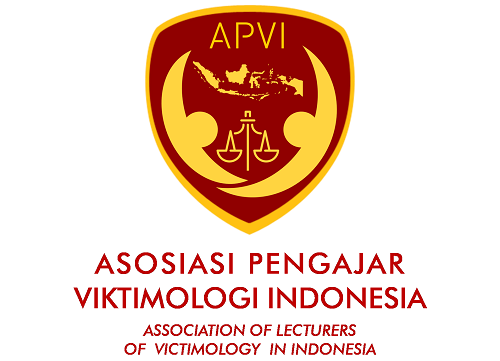The Rome Statute Impact: Challenge of Upholding Human Rights in Indonesia’s Human Rights Court
Abstract
This article examines the effect of enforcing gross human rights violations and the implications of Indonesia as a state that did not ratify the Rome Statute. This study is done by studying the legal basis of human rights courts in Indonesia. A doctrinal approach is used. The main legal materials used are the Human Right Court Law (2000) and human rights court decisions. The research findings indicate that the process of enforcing gross human rights violations requires integration between National Human Rights Commission as an investigator and the Attorney General's Office as an investigator. The substance of enforcing gross human rights violations is a formality because Indonesia, as a sovereign state, has the right to determine the model of enforcing gross human rights. However, in fact, there are still many gross human rights violations that cannot be resolved due to differences in perceptions of sufficient preliminary evidence. For this reason, reformulation of the Human Right Court Law (2000) is needed.
Full Text:
PDF View
References
Balta, A., Bax, M., & Letschert, R. (2021). Between idealism and realism: a comparative analysis of the reparations regimes of the International Criminal Court and the Extraordinary Chambers in the Courts of Cambodia. International Journal of Comparative and Applied Criminal Justice, 45(1), 15–38. https://doi.org/10.1080/01924036.2019.1695640
Barkin, J. S., & Cronin, B. (1994). The state and the nation: changing norms and the rules of sovereignty in international relations. International Organization, 48(1), 107–130. https://doi.org/10.1017/S0020818300000837
Bassiouni, M. C. E. M. W. (2023). Aut dedere aut judicare: the duty to extradite or prosecute in international law. Martinus Nijhoff Publisher.
Berween, M. (2022). The Fundamental Human Rights: An Islamic Perspective. The International Journal of Human Rights, 6(1), 61–79. https://doi.org/10.1080/714003742
Bibas, S. W. W. B.-W. (2010). International idealism meets domestic-criminal-procedure realism. Duke Law Journal, 59(4), 637–704.
Cohen, D. (2007). Hybrid justice in East Timor, Sierra Leone, and Cambodia: lessons learned and prospects for the future. Stanford Journal of International Law, 43(1), 1–38.
Cryer, R. (2005). International criminal law vs state sovereignty: another round? European Journal of International Law, 16(5), 979–1000. https://doi.org/10.1093/ejil/chi156
Cryer, R., Robinson, D., & Vasiliev, S. (2019). An introduction to international criminal law and procedure. Cambridge University Press.
Davidson, C. (2017). How to Read International Criminal Law: Strict Construction and the Rome Statute of the International Criminal Court. St. John’s Law Review:, 9(1), 37–103.
Decision of the Makassar District Court Number 1/Pid.Sus-HAM/2022/PN Mks, (2022). https://sipp.pn-makassar.go.id/
Dewanto, H. (2022). Settlement of Gross Human Rights Violations in the Perspective of Local Wisdom in Indonesia (Case Study of Tanjung Priok). Jurnal Dinamika Hukum, 22(2), 286–298. https://doi.org/10.20884/1.jdh.2022.22.2.3239
Dewi, Y. T. N., Niemann, G. R., & Triatmodjo, M. (2017). Indonesia’s Human Rights Court: Need for Reform. Asia-Pacific Journal on Human Rights and the Law, 18(1), 28–47. https://doi.org/10.1163/15718158-01801002
El Zeidy, M. M. (2002). The Principle of Complementarity: A New Machinery to Implement International Criminal Law. Michigan Journal of International Law, 23(4), 869–975.
Elderkin, R. (2015). The impact of international criminal law and the ICC on national constitutional arrangements. Global Constitutionalism, 4(2), 227–253. https://doi.org/10.1017/S2045381715000064
Eldridge, P. J. (2013). Politics of human rights in Southeast Asia. Routledge.
Gilligan, M. J. (2006). Is enforcement necessary for effectiveness? A model of the international criminal regime. International Organization, 60(4), 935–967. https://doi.org/10.1017/S0020818306060310
Grimmel, A. (2015). How Effective Are International Courts? International Studies Review, 17(3), 495–497. https://doi.org/10.1111/misr.12237
Hadiprayitno, I. I. (2010). No TitleDefensive enforcement: Human rights in Indonesia. Human Rights Review, 11, 373–399. https://doi.org/10.1007/s12142-009-0143-1
Hearty, K. (2018). Victims of’human rights abuses in transitional justice: hierarchies, perpetrators and the struggle for peace. The International Journal of Human Rights, 22(7), 888–909. https://doi.org/10.1080/13642987.2018.1485656
Heinze, E. A. (2010). The State of Sovereignty: Territories, Laws, Populations – Edited by Douglas Howland and Luise White Humanitarian Intervention: Confronting the Contradictions – Edited by Michael Newman. Governance An International Journal of Policy, Administration and Institution, 23(2), 357–365. https://doi.org/10.1111/j.1468-0491.2010.01483_1.x
Hiaiej, E. O. (2014). Prinsip-Prinsip Hukum Pidana. Cahaya Atma Pustaka.
Hiariej, E. O. (2009). Pengantar Hukum Pidana Internasional. Erlangga.
Hoecke, M. van, & Ost, F. (2010). Epistemological Perspectives in Legal Theory. In Legal Theory and the Legal Academy. Routledge.
Howland, D., & White, L. S. (2009). The state of sovereignty: Territories, laws, populations. Indiana University Press.
Huikuri, S. (2016). Empty promises: Indonesia’s non-ratification of the Rome Statute of the International Criminal Court. The Pacific Review, 30(1), 74–92. https://doi.org/10.1080/09512748.2016.1145725
Huneeus, A. (2013). International criminal law by other means: the quasi-criminal jurisdiction of the Human Rights Courts. American Journal of International Law, 107(1), 1–44. https://doi.org/10.5305/amerjintelaw.107.1.0001
Junaedi, J. (2014). The Existence of Human Rights Court as a National Effort to Eliminate the Severe Violation of Human Rights in Indonesia. Indonesia Law Review, 4(2), 176–195. https://doi.org/10.15742/ilrev.v4n2.110
Junaedi, J. (2018). Human Rights Court and Truth Reconciliation Commission for the Settlement of Human Rights in Indonesia. Indonesian Comparative Law Review, 1(1). https://doi.org/10.18196/iclr.1104
Khan, M. M., & Marwat, A. M. K. (2016). International Criminal Court (ICC): An Analysis of its Successes and Failures and Challenges Faced by the ICC Tribunals for War Crimes. Dialogue (Pakistan), 11(3), 242–256.
King, G., Keohane, R. O., & Verba, S. (2021). Designing social inquiry: Scientific inference in qualitative research. Princeton University Press.
Kotecha, B. (2020). The International Criminal Court’s selectivity and procedural justice. Journal of International Criminal Justice, 18(1), 107–139. https://doi.org/10.1093/jicj/mqaa020
Lawrence M. Friedman. (1975). The Legal System: A Social Science Perspective. Russel Sage Foundation.
Manley, S. (2016). Referencing Patterns at the International Criminal Court. European Journal of International Law, 27(1), 191–214. https://doi.org/10.1093/ejil/chw002
Martin, C. (2019). Challenging and refining the unwilling or unable doctrine. Vanderbilt Journal of Transnational Law, 52(2), 387–461.
Marzuki, S., & Ali, M. (2023). The settlement of past human rights violations in Indonesia. Cogent Social Sciences, 9(1), 2240643. https://doi.org/10.1080/23311886.2023.2240643
Morris, M. (2000). High Crimes and Misconceptions: The ICC and Non-Party States. In International Crimes, Peace, and Human Rights: The Role of the International Criminal Court (pp. 219–279). Brill Nijhoff. https://doi.org/10.1163/9789004479746_021
Muhdar, M. (2019). Penelitian doctrinal dan non-doctrinal Pendekatan aplikatif dalam Penelitian Hukum. Mulawarman University Press.
Nnawulezi, U. H. N. S. B. M. (2023). Addressing the Principle and Challenges of Enforcement and Prosecution under Universal Jurisdiction: Charting New Pathways for International Justice. Indonesian Journal of International Law, 20(2), 263.
Noorloos, M. van. (2021). A critical reflection on the right to the truth about gross human rights violations. Human Rights Law Review, 21(4), 874–898. https://doi.org/10.1093/hrlr/ngab018
Nouwen, S. M. (2006). “Hybrid courts” The hybrid category of a new type of international crimes courts. Utrecht Law Review, 2(2), 190-214. https://doi.org/10.18352/ulr.32
Nsereko, D. (2013). The ICC and Complementarity in practice. Leiden Journal of International Law, 26(2), 427–447. https://doi.org/10.1017/S0922156513000101
Opsahl, T. (1993). The Right to Life. In The European System for the Protection of Human Rights (pp. 207–223). Brill Nijhoff. https://doi.org/10.1163/9789004633599_016
Patra, R. (2018). The failure of settlement of human rights violations in indonesia and its solutions. Yustisia, 7(1), 197–215. https://doi.org/10.20961/yustisia.v7i1.19052
Philpott, D. (1995). Sovereignty: An introduction and brief history. Journal of International Affairs, 48(2), 353–368.
Piliouras, S. (2002). International Criminal Tribunal for the Former Yugoslavia and Milosevic’s Trial. NYLS Journal of Human Rights, 18(3), 515–525.
Plachta, M. (1999). Aut Dedere Aut Judicare: An Overview of Modes of Implementation and Approaches. Maastricht Journal of European and Comparative LawJournal of European and Comparative Law, 6(4), 331–365. https://doi.org/10.1177/1023263X9900600402
Raimondo, F. (2008). General principles of law in the decisions of international criminal courts and tribunals." In General Principles of Law in the Decisions of International Criminal Courts and Tribunals. Brill Nijhoff.
Rastan, R. (2008). Testing co-operation: the international criminal court and national authorities. Leiden Journal of International Law, 21(2), 431–456. https://doi.org/10.1017/S0922156508005025
Rohman, A. (2023). Hybrid Model Prospects For War Crimes: Non-Party States To The Rome Statute (The Sri Lanka Case). Kanun Jurnal Ilmu Hukum, 25(2), 381–397. https://doi.org/10.24815/kanun.v25i2.35292
Roht-Arriaza, N. (1990). State responsibility to investigate and prosecute grave human rights violations in international law. California Law Review, 78(2), 451–513.
Sefriani. (2007). Yurisdiksi ICC terhadap Negara non Anggota Statuta Roma 1998. Jurnal Hukum Ius Quia Iustum, 14(2), 14–332. https://doi.org/10.20885/iustum.vol14.iss2.art5
Sefriani. (2011). Ketaatan Masyarakat Internasional terhadap Hukum Internasional dalam Perspektif Filsafat Hukum. Jurnal Hukum, 3(3), 405–427.
Sekulow, J. A., & Ash, R. W. (2020). The Issue of ICC Jurisdiction Over Nationals of Non_Consenting, Non-Party States to the Rome Statute: Refuting Professor Dapo Akande’s Arguments. Carolina Journal of International Law and Business, 16(2), 1–65.
Shamsi, N. (2016). The ICC: A political tool? How the Rome Statute is susceptible to the pressures of more power states. Willamette Journal of International Law and Dispute Resolution, 24(1), 85–104.
Shraga, D., & Zacklin, R. (1994). The international criminal tribunal for the former Yugoslavia. European Journal of International Law, 5(3), 360–380. https://doi.org/10.1093/oxfordjournals.ejil.a035876
Snyder, H. (2019). Literature review as a research methodology: An overview and guidelines. Journal of Business Research, 104, 333–339. https://doi.org/10.1016/j.jbusres.2019.07.039
Ssenyonjo, M. (2018). State Withdrawal Notifications from the Rome Statute of the International Criminal Court: South Africa, Burundi and the Gambia. In Criminal Law Forum, 29(1), 63–119. https://doi.org/10.1007/s10609-017-9321-z
Sulistiyono, A., & Isharyanto. (2018). Sistem Peradilan di Indonesia Dalam Teori dan Praktik. PrenadaMedia Group.
Triyana, H. J. (2008). Geopolitical Analysis Concerning Universal Acceptance and Fairness of the International Criminal Court. Jurnal Global Strategis, 3(1), 43–52.
van Sliedregt, E. (2021). One rule for Them-Selectivity in international criminal law. Leiden Journal of International Law, 34(2), 283–290. https://doi.org/10.1017/S0922156521000121
Wemmers, J.-A. A.-M. de B. (2011). Globalization and victims’ rights at the international criminal court. In J. Letschert, R., van Dijk (Ed.), The New Faces of Victimhood: Globalization, Transnational Crimes and Victim Rights (8th ed., pp. 279–300). Springer Dordrecht. https://doi.org/10.1007/978-90-481-9020-1_12
Wind, M. (2009). Challenging sovereignty? The USA and the establishment of the International Criminal Court. Ethics & Global Politics, 2(2), 83–108. https://doi.org/10.3402/egp.v2i1.1973
Yogaswara, A. J. (2021). Impact of Philippines’Withdrawal From International Criminal Court on Crime Against Humanity Investigation in Philippines. Padjadjaran Journal of International Law, 4(2), 226–246. https://doi.org/10.23920/pjil.v4i2.413
Zunnuraeni. (2013). Human Rights Law Enforcement Politics in Indonesia in Cases of Gross Human Rights Violation. Jurnal IUS Kajian Hukum Dan Keadilan, 1(2), 356–369. https://doi.org/10.12345/ius.v1i2.242.
DOI: http://dx.doi.org/10.20884/1.jdh.2024.24.2.4228
Refbacks
- There are currently no refbacks.
JURNAL DINAMIKA HUKUM Indexed by :
 | Jurnal Dinamika Hukum | |
| Faculty of Law, Universitas Jenderal Soedirman | Copyright of Jurnal Dinamika Hukum | |
| Yustisia IV Building, Law Journal Center | ISSN 2407-6562 (Online) ISSN 1410-0797 (Print) | |
| Purwokerto, Central Java, Indonesia, 53122 | JDH is licensed under a Creative Commons Attribution 4.0 International License | |






